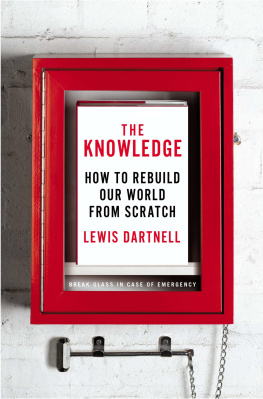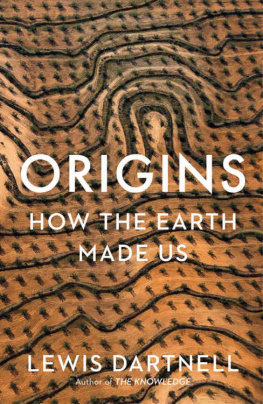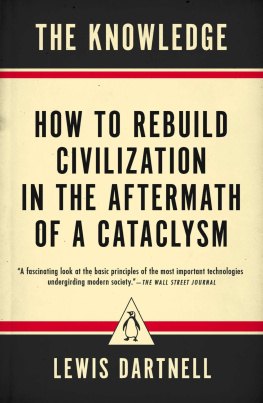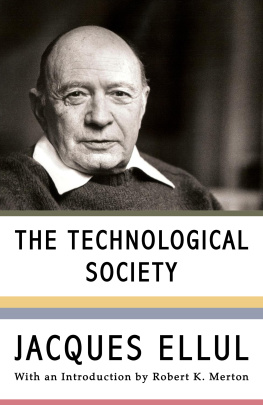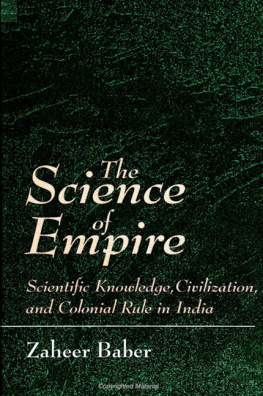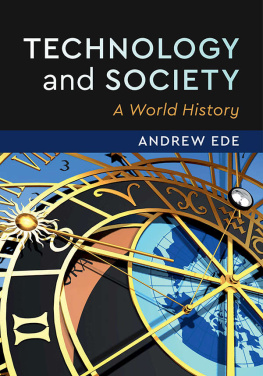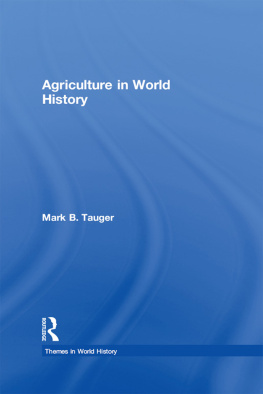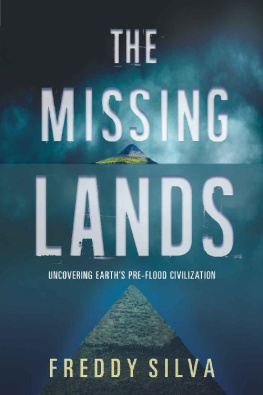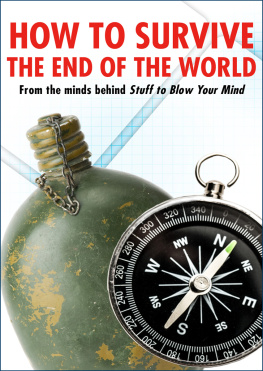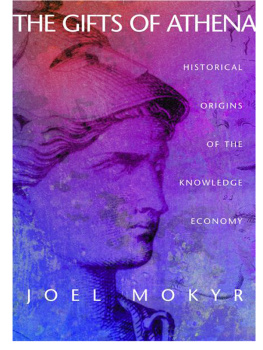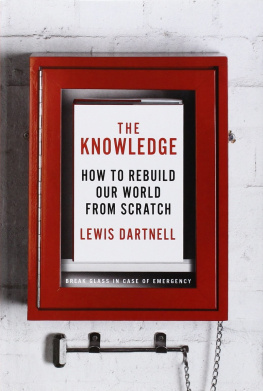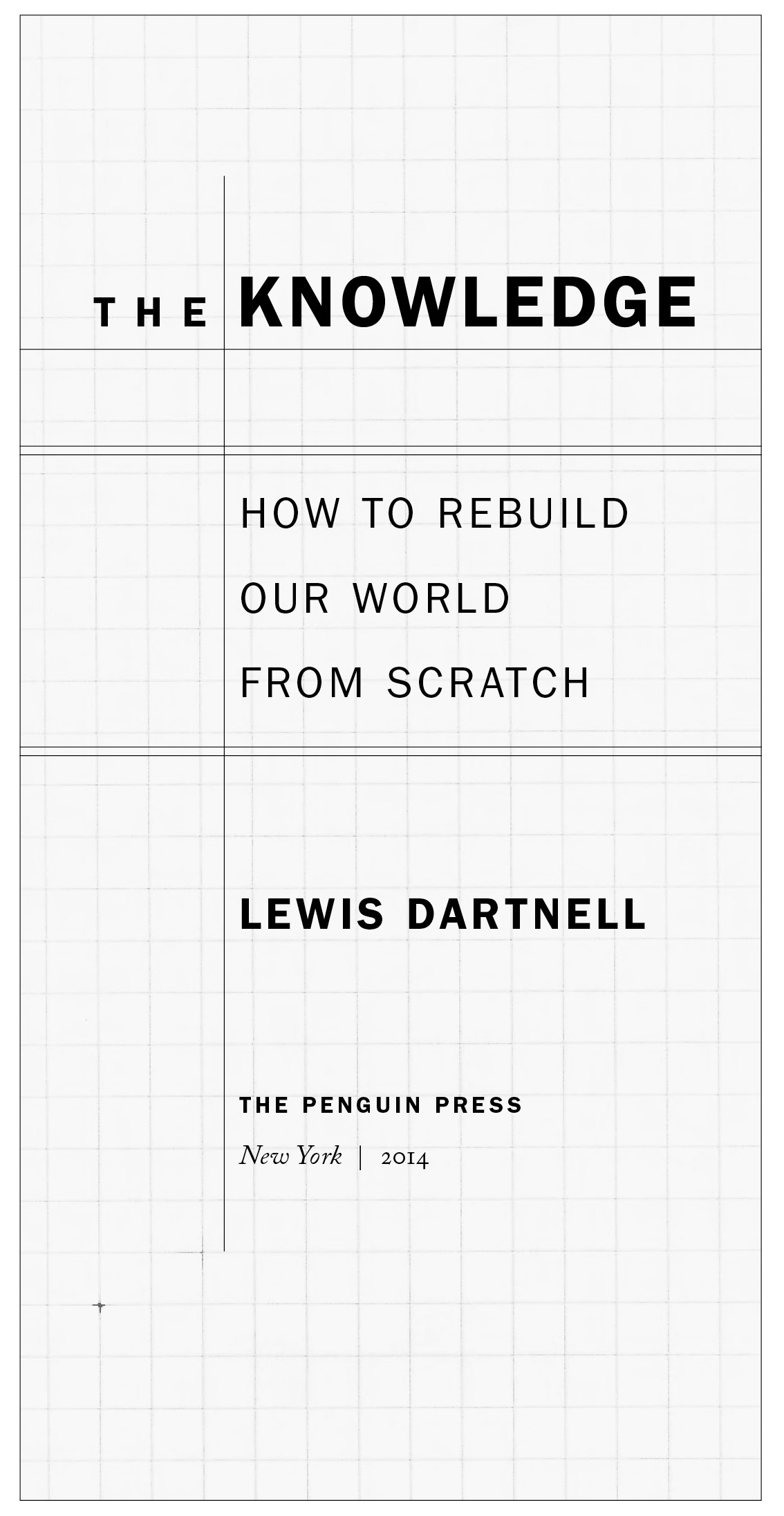THE PENGUIN PRESS
Published by the Penguin Group
Penguin Group (USA) LLC
375 Hudson Street
New York, New York 10014

USA | Canada | UK | Ireland | Australia | New Zealand | India | South Africa | China
penguin.com
A Penguin Random House Company
First published by The Penguin Press, a member of Penguin Group (USA) LLC, 2014
Copyright 2014 by Lewis Dartnell
Penguin supports copyright. Copyright fuels creativity, encourages diverse voices, promotes free speech, and creates a vibrant culture. Thank you for buying an authorized edition of this book and for complying with copyright laws by not reproducing, scanning, or distributing any part of it in any form without permission. You are supporting writers and allowing Penguin to continue to publish books for every reader.
constitutes an extension of this copyright page.
LIBRARY OF CONGRESS CATALOGING-IN-PUBLICATION DATA
Dartnell, Lewis.
The knowledge : how to rebuild our world from scratch / Lewis Dartnell.
pages cm
Includes bibliographical references and index.
ISBN 978-0-698-15165-9
1. TechnologyPopular works. 2. Discoveries in sciencePopular works. 3. SurvivalPopular works. 4. Knowledge, Theory ofPopular works. I. Title.
T47.D37 2014
500dc23 2013040820
The information contained in this book cannot replace sound judgment and good decision making, which can help reduce risk exposure, nor does the scope of this book allow for disclosure of all the potential hazards and risks involved. The author and publisher are not responsible for the instructions and information, as these are not intended for use except in the event of mass disasters, when the customary ways of doing things are not possible.
Version_1
To my wife, Vicky.
Thank you for saying yes.
These fragments I have shored against my ruins
T. S. E LIOT , THE WASTE LAND
CONTENTS
INTRODUCTION
THE WORLD AS WE KNOW IT HAS ENDED.
A particularly virulent strain of avian flu finally breached the species barrier and hopped successfully to human hosts, or was deliberately released in an act of bioterrorism. The contagion spread devastatingly quickly in the modern age of high-density cities and intercontinental air travel, and killed a large proportion of the global population before any effective immunization or even quarantine orders could be implemented.
Or tensions between India and Pakistan reached the breaking point and a border dispute escalated beyond all rational limits, culminating in the use of nuclear weapons. The warheads distinctive electromagnetic pulses were detected by defense surveillance in China and triggered a round of preemptive launches against the United States, which in turn spurred retaliatory strikes by America and its allies in Europe and Israel. Major cities worldwide were reduced to jagged plains of radioactive glass. The enormous volumes of dust and ash injected into the atmosphere reduced the amount of sunlight reaching the ground, causing a decades-long nuclear winter, the collapse of agriculture, and global famine.
Or the event was entirely beyond human control. A rocky asteroid, only around a mile across, slammed into the Earth and fatally changed atmospheric conditions. People within a few hundred kilometers of ground zero were dispatched in an instant by the blast wave of intense heat and pressure, and from that point on most of the rest of humanity was living on borrowed time. It didnt really matter which nation was struck: the rock and dust hurled up high into the atmosphereas well as the smoke produced by widespread fires ignited by the heat blastdispersed on the winds to smother the entire planet. As in a nuclear winter, global temperatures dropped enough to cause worldwide crop failures and massive famine.
This is the stuff of so many novels and films featuring post-apocalyptic worlds. The immediate aftermath is oftenas in Mad Max or Cormac McCarthys novel The Roadportrayed as barren and violent. Roving bands of scavengers hoard the remaining food and prey ruthlessly on those less well organized or armed. I suspect that, at least for a period after the initial shock of collapse, this might not be too far from the truth. Im an optimist, though: I think morality and rationality would ultimately prevail, and settlement and rebuilding begin.
The world as we know it has ended. The crucial question is: now what?
Once the survivors have come to terms with their predicamentthe collapse of the entire infrastructure that previously supported their liveswhat can they do to rise from the ashes to ensure they thrive in the long term? What crucial knowledge would they need to recover as rapidly as possible?
This is a survivors guidebook. Not one just concerned with keeping people alive in the weeks after the Fallplenty of handbooks have been written on survival skillsbut one that teaches how to orchestrate the rebuilding of a technologically advanced civilization. If you suddenly found yourself without a working example, could you explain how to build an internal combustion engine, or a clock, or a microscope? Or, even more basic, how to successfully cultivate crops and make clothes? The apocalyptic scenarios Im presenting here are also the starting point for a thought experiment: they are a vehicle for examining the fundamentals of science and technology, which, as knowledge becomes ever more specialized, feel very remote to most of us.
People living in developed nations have become disconnected from the everyday processes of civilization that support them. Individually, we are astoundingly ignorant of even the basics of the production of food, shelter, clothes, medicine, materials, or vital substances. Our survival skills have atrophied to the point that much of humanity would be incapable of sustaining itself if the life-support system of modern civilization failed, if food no longer magically appeared on store shelves, or clothes on hangers. Of course, there was a time when everyone was a survivalist, with a far more intimate connection to the land and methods of production, and to survive in a post-apocalyptic world youd need to turn back the clock and relearn these core skills.
Whats more, each piece of modern technology we take for granted requires an enormous support network of other technologies. Theres much more to making an iPhone than knowing the design and materials of each of its components. The device sits as the capstone on the very tip of a vast pyramid of enabling technologies: the mining and refining of the rare element indium for the touch screen, high-precision photolithographic manufacturing of microscopic circuitry in the computing processor chips, and the incredibly miniaturized components in the microphone, not to mention the network of cell phone towers and other infrastructure necessary to maintain telecommunications and the functioning of the phone. The first generation born after the Fall would find the internal mechanisms of a modern phone absolutely inscrutable, the pathways of its microchip circuits invisibly small to the human eye and their purpose utterly mysterious. The sci-fi author Arthur C. Clarke said in 1961 that any sufficiently advanced technology is indistinguishable from magic. In the aftermath of the Fall, the rub is that this miraculous technology would have belonged not to some star-faring alien species, but to people just a generation in our own past.

